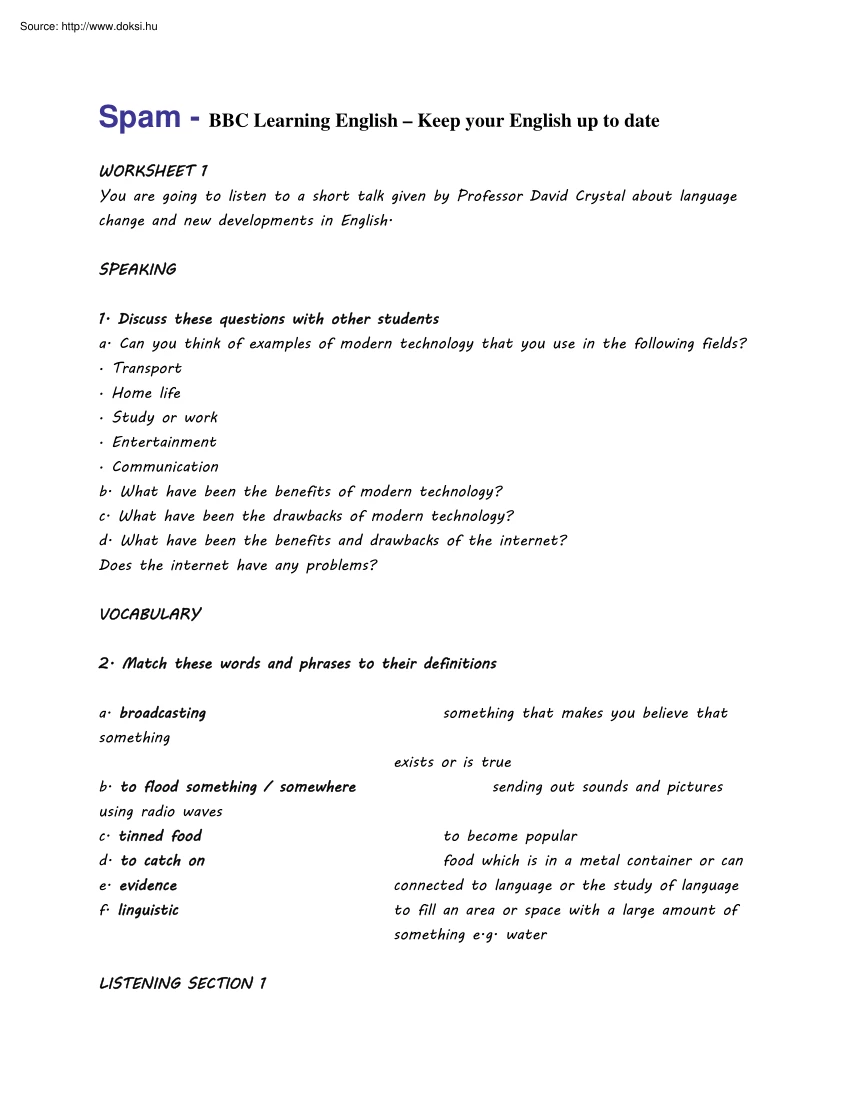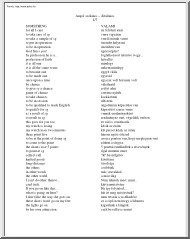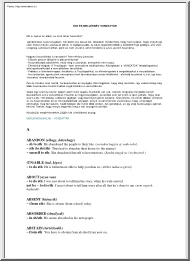Alapadatok
Év, oldalszám:2006, 3 oldal
Nyelv:magyar
Letöltések száma:53
Feltöltve:2012. október 21.
Méret:38 KB
Intézmény:
-
Megjegyzés:
Csatolmány:-
Letöltés PDF-ben:Kérlek jelentkezz be!
Értékelések
Nincs még értékelés. Legyél Te az első!
Legnépszerűbb doksik ebben a kategóriában
Tartalmi kivonat
Spam - BBC Learning English – Keep your English up to date WORKSHEET 1 You are going to listen to a short talk given by Professor David Crystal about language change and new developments in English. SPEAKING 1. Discuss these questions with other students a. Can you think of examples of modern technology that you use in the following fields? · Transport · Home life · Study or work · Entertainment · Communication b. What have been the benefits of modern technology? c. What have been the drawbacks of modern technology? d. What have been the benefits and drawbacks of the internet? Does the internet have any problems? VOCABULARY 2. Match these words and phrases to their definitions a. broadcasting something that makes you believe that something exists or is true b. to flood something / somewhere sending out sounds and pictures using radio waves c. tinned food to become popular d. to catch on food which is in a metal container or can e. evidence connected to language or the
study of language f. linguistic to fill an area or space with a large amount of something e.g water LISTENING SECTION 1 3. Now, listen to Professor Crystal talking about how technology affects the development of the English language. Answer these questions a. Which item of modern technology does Professor Crystal concentrate on? b. What is the new word that has come from this technology? 4. Listen again and answer these questions a. What other types of technology does Professor Crystal mention? b. Does he think it is strange that new words have come from internet technology? c. Complete the definition of spam with the words in the box large unwanted receive advertisements email Spam is the word for the messages and that come into your in-box. These messages come in amounts and you do not ask to them. WORKSHEET 2 - LISTENING SECTION 2 5. At the end of part one of his talk, Professor Crystal asks, “But why the word spam for this sort of thing?”
Which of the following explanations of the original meaning of spam do you think is correct? a. Spam is a type of poor quality meat that used to be very common b. Spam is the rubbish left on the beach after the sea has gone down c. Spam is the stuff which collects in the bottom of your bag eg small coins, pieces of paper, pen lids etc. d. Spam is the advertisements for pizza restaurants etc which are posted through your door Listen to Section 2 of the talk and check your ideas. Were you correct? 6. Are the following sentences true or false? a. Spam was a fresh meat b. Monty Python was a comedy series on the radio c. The Monty Python song about spam became very popular d. In the song, spam came with everything and it was not really wanted e. You can’t use spam as a verb 7. What is the name for someone who sends out spam emails? Listen again to check your answers. WORKSHEET 3 - EXTRA WORK VOCABULARY 1 Look at the tape script and find words or phrases that mean the following. a. to
meet something b. very popular or trendy c. a short comedy performance or scene LANGUAGE 2. Although the modern meaning of spam is connected to the internet, originally it was a type of food. Look at these expressions which all use food words Underline the food words. Have you eaten those types of food? a. It’s not my cup of tea I prefer rock music b. Stop beefing about doing the shopping It’s your turn, so just do it c. I was so scared my legs turned to jelly d. He is in a pickle now, how will he escape? e. The new computer game is selling like hot cakes f. Immigration is a political hot potato at the moment g. He is such a hammy actor, I think he ruins the film 3. Match the food expressions above with the definitions below i. To complain about something ii. To become weak and wobbly iii. To perform in a very artificial way iv. To sell very quickly v. To not be a personal preference vi. To be in a difficult situation vii. To be a controversial issue, to be something no-one wants
to deal with
study of language f. linguistic to fill an area or space with a large amount of something e.g water LISTENING SECTION 1 3. Now, listen to Professor Crystal talking about how technology affects the development of the English language. Answer these questions a. Which item of modern technology does Professor Crystal concentrate on? b. What is the new word that has come from this technology? 4. Listen again and answer these questions a. What other types of technology does Professor Crystal mention? b. Does he think it is strange that new words have come from internet technology? c. Complete the definition of spam with the words in the box large unwanted receive advertisements email Spam is the word for the messages and that come into your in-box. These messages come in amounts and you do not ask to them. WORKSHEET 2 - LISTENING SECTION 2 5. At the end of part one of his talk, Professor Crystal asks, “But why the word spam for this sort of thing?”
Which of the following explanations of the original meaning of spam do you think is correct? a. Spam is a type of poor quality meat that used to be very common b. Spam is the rubbish left on the beach after the sea has gone down c. Spam is the stuff which collects in the bottom of your bag eg small coins, pieces of paper, pen lids etc. d. Spam is the advertisements for pizza restaurants etc which are posted through your door Listen to Section 2 of the talk and check your ideas. Were you correct? 6. Are the following sentences true or false? a. Spam was a fresh meat b. Monty Python was a comedy series on the radio c. The Monty Python song about spam became very popular d. In the song, spam came with everything and it was not really wanted e. You can’t use spam as a verb 7. What is the name for someone who sends out spam emails? Listen again to check your answers. WORKSHEET 3 - EXTRA WORK VOCABULARY 1 Look at the tape script and find words or phrases that mean the following. a. to
meet something b. very popular or trendy c. a short comedy performance or scene LANGUAGE 2. Although the modern meaning of spam is connected to the internet, originally it was a type of food. Look at these expressions which all use food words Underline the food words. Have you eaten those types of food? a. It’s not my cup of tea I prefer rock music b. Stop beefing about doing the shopping It’s your turn, so just do it c. I was so scared my legs turned to jelly d. He is in a pickle now, how will he escape? e. The new computer game is selling like hot cakes f. Immigration is a political hot potato at the moment g. He is such a hammy actor, I think he ruins the film 3. Match the food expressions above with the definitions below i. To complain about something ii. To become weak and wobbly iii. To perform in a very artificial way iv. To sell very quickly v. To not be a personal preference vi. To be in a difficult situation vii. To be a controversial issue, to be something no-one wants
to deal with





